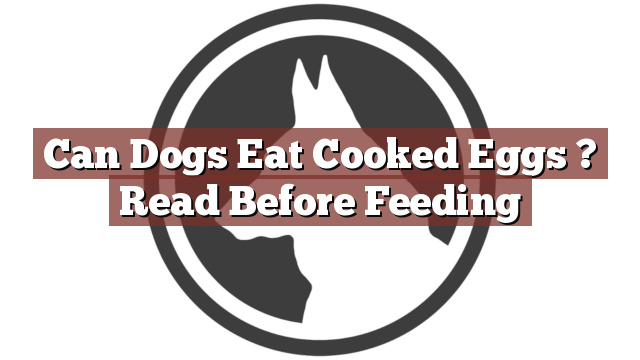Understanding Your Dog’s Dietary Needs
As a responsible dog owner, it is crucial to understand your furry friend’s dietary needs. Dogs, just like humans, require a balanced diet that includes proteins, carbohydrates, fats, vitamins, and minerals. While commercial dog food is designed to meet these requirements, many pet owners also like to supplement their dog’s diet with human food. However, not all human foods are safe for dogs, and it is essential to be aware of what you can and cannot feed your canine companion. One such food item that often raises questions is eggs.
Can Dogs Eat Cooked Eggs? Read Before Feeding
Can dogs eat cooked eggs? This is a common question that many dog owners ask. The answer is yes, dogs can eat cooked eggs. In fact, cooked eggs can be a healthy addition to your dog’s diet. Eggs are an excellent source of protein and contain essential amino acids that contribute to muscle growth and repair. They also provide vitamins such as vitamin A, vitamin D, and vitamin B12, along with minerals like iron and selenium. However, it is important to note that eggs should always be cooked before feeding them to your dog.
Pros and Cons of Feeding Cooked Eggs to Dogs
Feeding cooked eggs to your dog can have several benefits. As mentioned earlier, eggs are a rich source of protein, which is vital for your dog’s overall health and well-being. They can help in muscle development, enhance the immune system, and contribute to healthy skin and coat. Eggs are also easily digestible, making them an excellent option for dogs with sensitive stomachs or those recovering from an illness.
However, it is essential to be cautious when feeding eggs to your dog. Some dogs may have allergies or sensitivities to eggs, so it is crucial to introduce them slowly and monitor for any adverse reactions. Additionally, eggs should always be cooked thoroughly to kill any possible bacteria, such as Salmonella. Raw eggs should never be fed to dogs as they can pose a risk of bacterial infection.
Conclusion: Making the Right Decision for Your Dog’s Health
In conclusion, cooked eggs can be a healthy addition to your dog’s diet. They are a great source of protein, vitamins, and minerals. However, it is essential to remember that every dog is different, and some may have allergies or sensitivities to eggs. Always introduce eggs slowly and observe your dog for any negative reactions. Additionally, ensure that the eggs are fully cooked to eliminate any potential bacterial risks. Consulting with your veterinarian is always a wise decision when considering any dietary changes for your dog. By understanding your dog’s specific needs and taking necessary precautions, you can make informed decisions about what to feed your beloved pet.
Thank you for taking the time to read through our exploration of [page_title]. As every dog lover knows, our furry friends have unique dietary needs and responses, often varying from one canine to another. This is why it's paramount to approach any changes in their diet with caution and knowledge.
Before introducing any new treats or making alterations to your dog's diet based on our insights, it's crucial to consult with a veterinarian about [page_title]. Their expertise ensures that the choices you make are well-suited to your particular pet's health and well-being.
Even seemingly harmless foods can sometimes lead to allergic reactions or digestive issues, which is why monitoring your dog after introducing any new food item is essential.
The content provided here on [page_title] is crafted with care, thorough research, and a genuine love for dogs. Nevertheless, it serves as a general guideline and should not be considered a substitute for professional veterinary advice.
Always prioritize the expert insights of your veterinarian, and remember that the health and happiness of your furry companion come first.
May your journey with your pet continue to be filled with joy, love, and safe culinary adventures. Happy reading, and even happier snacking for your canine friend!

